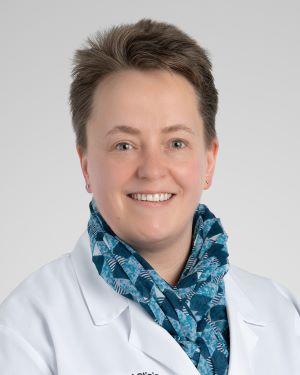Research News
04/08/2024
Cleveland Clinic studies mitochondria to support more successful organ transplants
Dr. Andrea Schlegel leads human organ transplant research investigating the critical role of mitochondria in evaluating long-term graft viability.

Left to right: Chunbao Jiao, MD (Postdoctoral Fellow); Andrea Schlegel, MD, MBA (Staff Surgeon Transplant Center, Associate Staff, Inflammation & Immunity); Keyue Sun, MD (Postdoctoral Fellow); Mingyi Zhang, MD (Research Scholar)
Over the past decade, advances in surgical procedures, technology and immune suppression methods have increased the number and quality of donor organs, and improved outcomes in human organ transplantation. One new focus is on mitochondria's critical role in improving organ viability and minimizing post-transplant complications and rejection.
Andrea Schlegel, MD, MBA, associate staff in the Department of Inflammation & Immunity leads a team studying the role mitochondrial mechanisms play during organ transplantation. She is an academic transplant surgeon who specializes in liver transplantation and hepatobiliary surgery.
"With an increasing number of candidates on the waiting lists and a worldwide lack of suitable donors, there is an urgent need to better understand the biological mechanisms as they relate to transplantation," Dr. Schlegel says. "Our mitochondrial studies focus on the critical element of underlying inflammation that can lead to organ dysfunction and recipient complications after transplantation."
Mitochondria are the key players in various biological processes, including inflammation, cancer development and aging. These cell powerhouses process energy for our cells and tissues, which are critical in repairing tissues and the cellular processes that allow the body to accept a donated organ.
Mitochondria suffer during ischemia (lack of oxygen when organs are transported on ice). After transplantation they trigger inflammation and subsequent organ dysfunction and complications. Transplant teams and researchers are focusing on the improvement of these organs with new machine perfusion technologies. This technology allows organs to undergo ex-situ perfusion at different temperatures, allowing viability assessment.
The Schlegel laboratory aims to identify organs that can immediately function after transplant through their viability assessment, avoiding complications and graft loss or recipient death.
"Identifying the mechanisms of mitochondrial dysfunction that lead to ischemia- reperfusion injury and ongoing inflammation after organ transplantation is key," says Dr. Schlegel. "Our research has the potential to determine long-term graft survival."
By developing new markers to predict organ viability applied before decisions to accept or decline a specific donor organ, Dr. Schlegel and her team are designing new treatments and technologies that will have a significant impact on the well-being of both pediatric and adult organ recipients. Real-time spectroscopy can also quantify the number of molecules released from cells and mitochondria during machine perfusion.
Recent publications by Dr. Schlegel and her team include Liver Transplantation, International Journal of Surgery, Journal of Hepatology, EBioMedicine and Annals of Surgery. These papers summarize current strategies to assess organ viability before transplantation to safely increase the number of organs accepted for transplantation from the pool of donors that are deemed unsuitable. The team's research has advanced numerous life saving new practices in areas including Normothermic machine perfusion, ischemia-free organ transplantation and hypothermic oxygenated perfusion, among many others.
"As researchers, our large clinical transplant program at the Cleveland Clinic Transplant Center, gives us a unique opportunity to explore novel mechanisms in the laboratory with direct transfer to clinical practice of organ perfusion and transplantation, and save lives," Dr. Schlegel says.
April is National Donate Life Month, focusing attention on the importance of organ, eye and tissue donation and honoring donors and their families who save lives by donating organs for transplantation.
Featured Experts
News Category
Related News
Research areas
Want To Support Ground-Breaking Research at Cleveland Clinic?
Discover how you can help Cleveland Clinic save lives and continue to lead the transformation of healthcare.
Give to Cleveland Clinic